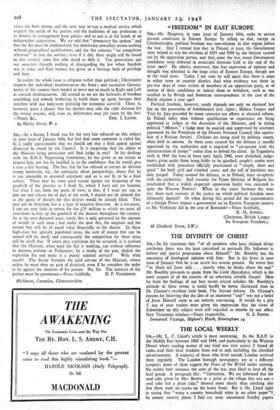"FREEDOM" IN EAST EUROPE
Snt,—Mr. Hargrave, in your issue of January 16th, seeks to excuse present conditions in Eastern Europe by telling us that, except in Czechoslovakia, political freedom was non-existent in that region jaefore the war. May I remind him that in Poland, at least, the Government were helped to win the electiOns of 1935 and 1938 by the boycott carried out by the opposition parties, and that,none the less, many Government candidates were defeated in municipal elections held at the end of the latter year? He admits, moreover, that free expression of opinion and thought was tolerated in the large cities of Eastern Europe, though not in the rural areas. Today I am sure he will agree that there is none in either town or country district. And what evidence was there in pre-war days of mass arrests of members of an opposition party, or of torture of their candidates to induce them to withdraw, such as was testified to by British and American correspondents in the case of the Polish election a year ago?
Political freedom, however, surely depends not only on electoral law but on the possession of fundamental civil . rights ; Habeas Corpus and Trial by Jury preceded by many centuries our efforts at electoral reform. In Poland today men without qualification or experience are being appointed as judges at the discretion of the Minister, and in trying political " offences " a judge may be assisted and supervised by assessors appointed by the Presidium of the District National Council (the equiva- lent of a Russian Soviet). Civilians- are being tried by military courts, often held in camera. In these casts counsel for the defence is usually appointed by the authorities and is required to " co-operate with the administration of justice " rather than to defend his client. In Yugoslavia early in 1945 the laws in force until April, 1941, were abolished, judge- ments given under them being liable to be quashed; people's courts were established with procedure officially proclaimed as " simple, short and quick " for both civil and criminal cases; and the roll of barristers was duly purged. Today counsel for defence, as in Poland, must co-operate with the authorities. And recently the Prime Minister of Bulgaria has proclaimed that a widely respected opposition leader was executed to spite the Western Powers! When in the years between the wars was there such travesty of the justice on which political freedom must ultimately depend? Or when during this period did the representative of a foreign Power impose a government on an Eastern European country as Mr. Vyshinsky did in the case of Rumania?—Yours faithfully,
K. M, Amou.. (Chairman, British League for European Freedom.)
66 Elizabeth Street, S.W.r.






























 Previous page
Previous page